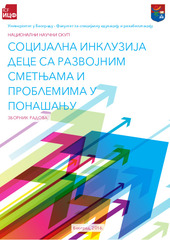Приказ основних података о документу
Porodični status i problemi u ponašanju kod dece sa lakom intelektualnom ometenošću
Family status and challenging behaviour in children with mild intellectual disability
| dc.contributor | Jugović Aleksandar | |
| dc.contributor | Japundža-Milisavljević Mirjana | |
| dc.contributor | Grbović Aleksandra | |
| dc.creator | Buha, Nataša | |
| dc.creator | Gligorović, Milica | |
| dc.date.accessioned | 2021-06-17T13:22:26Z | |
| dc.date.available | 2021-06-17T13:22:26Z | |
| dc.date.issued | 2016 | |
| dc.identifier.isbn | 978-86-6203-089-4 | |
| dc.identifier.uri | http://rfasper.fasper.bg.ac.rs/handle/123456789/2504 | |
| dc.description.abstract | Neposredno okruženje u kome dete odrasta predstavlja jedan od značajnih prediktora pojave bihejvioralnih i emocionalnih teškoća. Cilj ovog istraživanja je da se utvrdi odnos između po- rodičnog statusa i ispoljavanja problema u ponašanju kod dece sa lakom intelektualnom ometenošću (LIO). Uzorkom je obuhvaćeno 99 ispitanika sa LIO, oba pola (44,4% devojčica), uzrasta od 10 do 14 godina. U potpunoj porodici živi 56,6% dece, u porodici sa jednim roditeljem 21,2%, dok u domu za decu bez roditeljskog staranja živi njih 22,2%. Za procenu prisu- stva problema u ponašanju upotrebljen je drugi deo ABS-S:2 skale adaptivnog funkcionisanja. Analizom rezultata utvrđeno je da ponašanje dece sa LIO koja žive u porodičnom okruženju ne odstupa od normi za dati hrono- loški uzrast. Nisu utvrđene značajne razlike u ponašanju između dece koja žive u potpunoj porodici i dece iz jednoroditeljskih po- rodica (p>0,05). Problemi u ponašanju se registruju kod dece bez roditeljskog staranja, uz dominaciju teškoća eksternalizovanog tipa. U odnosu na decu koja žive u porodičnom okruženju, deca bez roditeljskog staranja su percipirana kao manje prilagodljiva (p<0,01) i pouzdana (p<0,000-0,01), sa većim brojem karakteristi- ka prisilnog (p<0,000-0,01) i uznemirujućeg interpersonalnog ponašanja (p<0,05). Kada se uporede samo sa decom iz potpunih po- rodica, deca bez roditeljskog staranja češće ispoljavaju nasil- nički tip ponašanja (p<0,05), kao i različite oblike stereotip- nog, hiperaktivnog i neprikladnog socijalnog ponašanja (p<0,01). | |
| dc.description.abstract | Immediate environment in which child is growing up, represents one of significant predictors of behavioural and emotional difficulties in children. The aim of this research is to determine the relationship between family status and expression of challenging behaviour in children with mild intellectual disability (MID). The sample consisted of 99 participants with MID, of both genders (44,4% of girls), aged between 10 and 14 years. In complete family lives 56,6% of children, in single parent family lives 21,2%, while in institution for children without parental care lives 22,2% of them. Challenging behavior was assessed by second part of aBS-S:2 scale of adaptive behavior. analysis of the results revealed that behaviour of children with MID living in family environment does not differ form norms related to their calendar age. There were no significant behavioural differences between children living in single-and two-parent families (p>0,05). Challenging behavior is registered in MID children without parental care. Externalized challenging behavior is prevalent. Compared to children living in family environment, children without parental care are perceived as less adaptable (p<0,01) and reliable (p<0,000-0,01), with higher number of self-abusive (p<0,000- 0,01) and disturbing interpersonal behaviour (p<0,05). Compared to children living in complete families, MID children without parental care express violent type of behaviour more often (p<0,05), as well as various forms of stereotyped, hyperactive and inappropriate social behaviour (p<0,01). | |
| dc.language | sr | |
| dc.publisher | Univerzitet u Beogradu – Fakultet za specijalnu edukaciju i rehabilitaciju/ University of Belgrade – Faculty of Special Education and Rehabilitation | |
| dc.rights | openAccess | |
| dc.rights.uri | https://creativecommons.org/licenses/by-sa/4.0/ | |
| dc.source | Zbornik radova - Nacionalni naučni skup, „Socijalna inkluzija dece sa razvojnim smetnjama i problemima u ponašanju”, Beograd, 6. decembar 2016 | |
| dc.subject | laka intelektualna ometenost | |
| dc.subject | problemi u ponašanju | |
| dc.subject | porodični status | |
| dc.subject | deca bez roditeljskog staranja | |
| dc.subject | mild intellectual disability | |
| dc.subject | challenging behaviour | |
| dc.subject | family status | |
| dc.subject | children without parental care | |
| dc.subject | children | |
| dc.subject | without parental care | |
| dc.title | Porodični status i problemi u ponašanju kod dece sa lakom intelektualnom ometenošću | sr |
| dc.title | Family status and challenging behaviour in children with mild intellectual disability | |
| dc.type | conferenceObject | |
| dc.type | conferenceObject | |
| dc.rights.license | BY-SA | |
| dc.citation.epage | 177 | |
| dc.citation.other | : 169-177 | |
| dc.citation.spage | 169 | |
| dc.identifier.fulltext | http://rfasper.fasper.bg.ac.rs/bitstream/id/6383/Untitled17.pdf | |
| dc.identifier.rcub | https://hdl.handle.net/21.15107/rcub_rfasper_2504 | |
| dc.type.version | publishedVersion |


